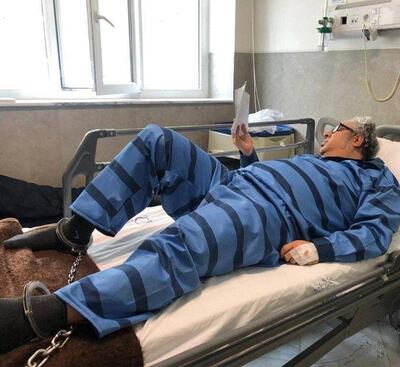Iran “aided and abetted” in the death of jailed Iranian poet Baktash Abtin through its failure to properly treat him for Covid-19, US-based campaigners have said.
Abtin, 48, died last week while in an induced coma in hospital after being denied treatment at Evin prison, Tehran, where he was serving a six-year sentence on national security charges.
The poet and filmmaker was a leading light at the Iranian Writers’ Association, which continues to campaign against censorship despite being banned by the authorities.
Free speech campaign group PEN America called on two of his colleagues who were sentenced to jail at the same time as Abtin for, among other charges, “propagating against the regime” to be released immediately over concerns about the virus and treatment at the prison.
“We mourn the utterly preventable death of Baktash Abtin,” said the organisation’s chief executive Suzanne Nossel. She described the writer as a “steadfast leader” of the literary community in Iran.
“Covid is a natural killer but Abtin’s death was aided and abetted by the Iranian government every step of the way.”
She described Evin jail as a “perpetual super-spreader” and said Abtin’s other medical conditions meant his detention from September last year was “an effective death sentence”.
chief executive of the Iranian Writers’ Association
“Abtin was denied medical treatment, his comorbidities were ignored and at times he was shackled to his bed,” she said.
Abtin was moved to hospital in mid-December after supporters said authorities delayed his transfer for 10 days. His condition worsened and he was put into a coma at the start of the year from which he failed to recover.
The three jailed writers, Abtin, Keyvan Bajan and Reza Khandan Mahabadi, were given the organisation’s Freedom to Write award in September.
In his acceptance speech shortly before being recalled to prison, Abtin said: “I hope for a day when no one in the world is imprisoned for their thoughts and for having such a beautiful demand as freedom.”

Dozens of writers from around the world, including Margaret Atwood, Orhan Pamuk and J.M. Coetzee, signed a letter to Iranian President Ebrahim Raisi in October last year urging him to release the three men.
Abtin’s alleged crimes had included involvement in writing a book to mark the 50th anniversary of the Iranian Writers’ Association, he had told the Centre for Human Rights in Iran.
“It would have been an honour but unfortunately everybody knows that I had no part in writing it,” he told the group. “At the time, I lived on Kish Island and I still live there and I wasn’t around to help with the book. Attributing the book to me is an absolute lie.”
He said limited editions of the four-volume history never became public because they were stolen from the print shop before they were distributed.


